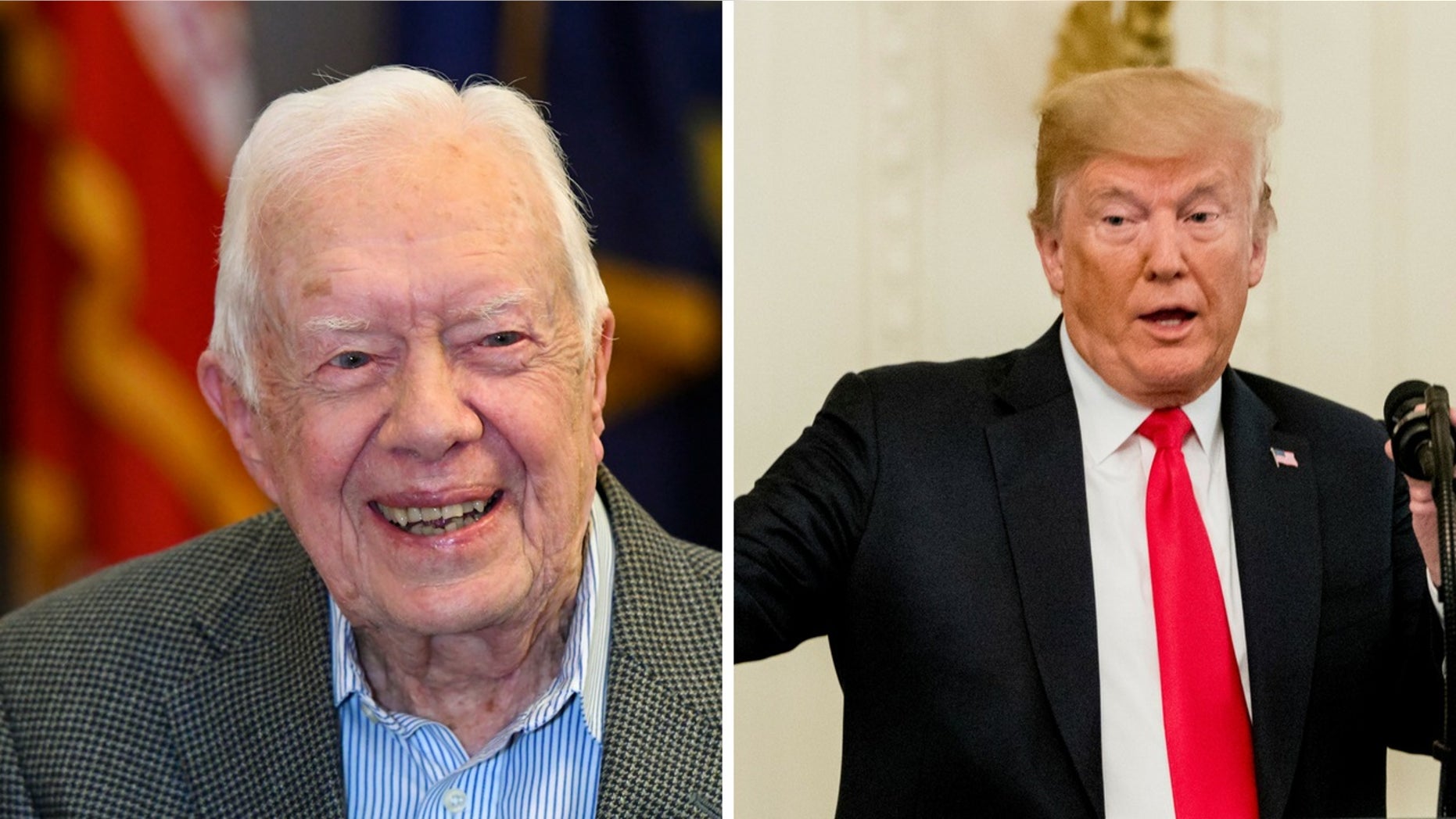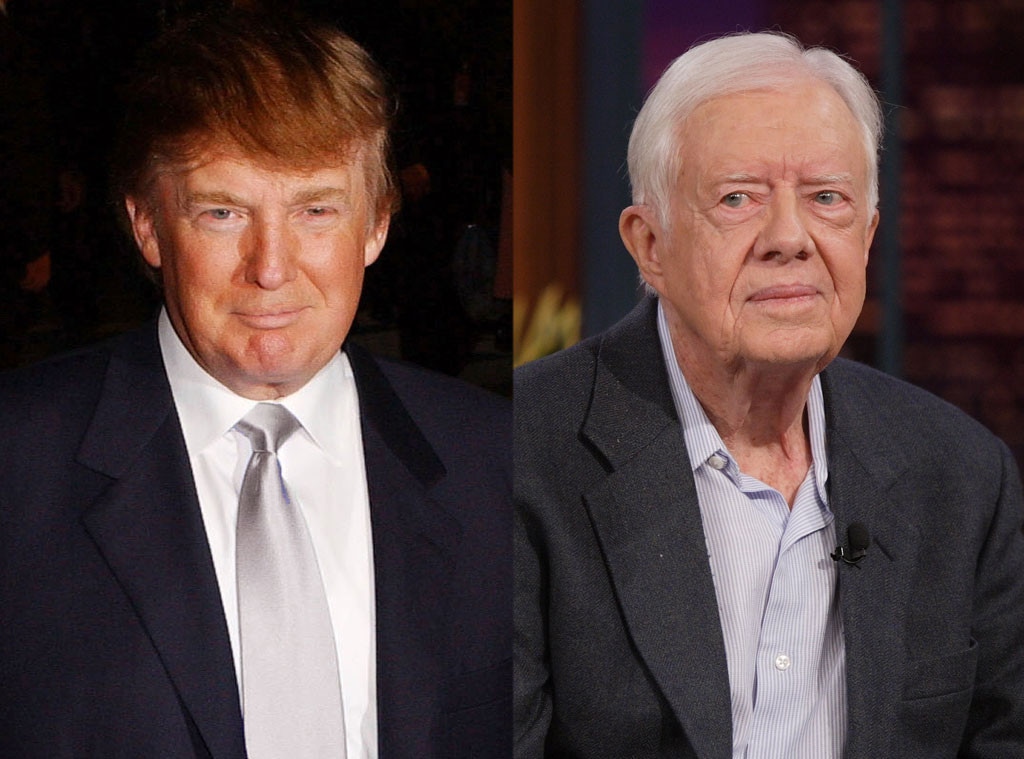Trump's Jimmy Carter Remarks Spark Controversy: What Happened?
Did Donald Trumps recent remarks about Jimmy Carter specifically, the assertion that the former president "died a happy man" truly reflect a genuine sentiment, or do they represent a continuation of a long-standing pattern of using Carter as a political foil?
Trump's words, delivered in the Oval Office on April 17th and echoed in various public forums, suggest a complex and, at times, contradictory relationship with the legacy of the 39th President of the United States.
The death of Jimmy Carter, at the age of 99, prompted an outpouring of tributes, reflecting his decades of public service and humanitarian work. Among those expressing their condolences was Donald Trump, who, despite a history of using Carter as a punchline, also offered a message of sympathy. However, these expressions of goodwill were immediately followed by comments that seemed to undermine the sincerity of the gesture. During a meeting in the Oval Office, Trump reportedly stated that Carter "died a happy man." This remark, while seemingly innocuous on its own, gained a different shade of meaning when considered within the context of Trumps previous statements.
The former presidents remarks were often framed within a broader critique of the current administration, specifically targeting President Joe Biden. Trump has frequently used Carter as a comparative measure, arguing that Bidens presidency is demonstrably worse. On Carter's 100th birthday, for instance, Trump stated that Carter was "the happiest man because Jimmy Carter is considered a brilliant president" in comparison to Biden. This sentiment was repeated in January 2024, when Trump commented on Melania Trumps attendance at Rosalynn Carter's funeral. In essence, Trump has leveraged Carter's historical standing, or his perceived failings, to bolster his critiques of Biden's policies and performance.
The contrast between Trump's public condolences and his past commentary on Carter highlights the complicated nature of political discourse, where personal relationships and professional rivalries intersect. The public reactions to his statement, from both supporters and critics, were immediate. Some viewed the remarks as callous and disrespectful, particularly given the context of Carter's passing. Others saw it as characteristic of Trump's direct and often provocative communication style. This dual nature has long defined Trumps approach to the American political landscape.
Trumps tendency to view political opponents as adversaries is well-documented. This approach is not new. Prior to Carter's death, Donald Trump often used him as a punchline during campaign rallies and interviews. In 2014, he made a comment on what was then Twitter that was seemingly sarcastic, but clearly intended to belittle Carter's presidential tenure. Trump has consistently used his social media platforms and public appearances to express his opinions and criticize his political opponents. These criticisms, combined with his frequent assertions that Biden is the "worst" president in US history, underscore his tendency to use historical figures and events as tools to score political points.
This pattern, however, is not unique. His assessment of Biden in comparison to Carter, and others, are the basis of his political positions and public image. Biden is the worst president in the history of our country, worse than Jimmy Carter by a long shot, Trump said at a campaign stop earlier in. Such pronouncements serve multiple purposes; they define Trump's opposition to the current administration, they cast himself as a strong alternative, and they consolidate support among voters who share his negative view of Biden.
Analyzing Trumps remarks on Carter requires examining the context and the motivations behind them. Its clear that Trump often uses the past to shape the present. As scholar Michael Chervinsky notes, "much of what Trump says is shaped by the 1980s". This is true not only in terms of foreign policy but also in terms of the cultural values and norms of the era. Carter's presidency, which spanned the latter half of the 1970s, is often viewed through the lens of the ensuing decade. Economic challenges, such as high inflation, and foreign policy crises, such as the Iran hostage crisis, have become key points of contrast in Trumps political messaging.
For Trump, Carter's presidency provides a ready-made benchmark against which to measure Biden's administration. By implicitly or explicitly comparing the two, Trump aims to position himself as the superior leader. The use of Carter as a point of comparison allows Trump to criticize specific policies or political decisions. I mean, Jimmy Carter didn't let 21 million people come into our country without checks, without balance, without anything from parts unknown," Trump said, highlighting his stance on immigration. These comparisons, regardless of their historical accuracy or nuances, serve to bolster his political arguments and draw distinctions between himself and his rivals.
These comments also reflect a broader approach to the presidency that emphasizes strength, decisiveness, and a willingness to challenge established norms. Trump's rhetoric is often built around the idea of "making America great again," a slogan that implies a return to a perceived golden age. By contrasting current events with the past, Trump seeks to underscore his argument that the country has lost its way and that his leadership is needed to restore it.
Trumps own reflections on the responsibilities of the presidency provide a fascinating perspective. "Those of us who have been fortunate to have served as president understand this is a very exclusive club, and only we can relate to the enormous responsibility of leading the greatest nation in history, he wrote on Truth Social. This statement, while expressing respect for the office of president, also highlights the importance of individual identity and experience, which he believes separate him from his rivals. In this sense, Trump's commentary on Carter can be interpreted as an effort to shape the narrative surrounding his political career and cement his place in the history of the American presidency.
The juxtaposition of Trumps words of praise and his previous mockery of Carter underscores the complexity of his interactions with other public figures. He has often praised Carter and stated that he was 'owed a debt of gratitude', however, he was also mocking the 39th president on his 100th birthday just months ago. Trump's remarks reflect his view on how to approach politics, which is often built upon a foundation of performance and the cultivation of a particular public persona.
Ultimately, Donald Trump's words about Jimmy Carter, both before and after his death, reveal more about Trump himself than they do about Carter. His remarks are a window into his political strategy, his communication style, and his broader vision for the United States. They are a testament to his belief in the power of comparison and the enduring impact of history on contemporary political discourse. While offering condolences and expressing admiration, Trumps consistent use of Carter as a tool to critique his rivals ensures that the former presidents legacy will continue to shape the public sphere, providing a backdrop against which current events can be understood.
Former President Donald Trump's comments about former president Jimmy Carter, in the wake of Carter's passing, were met with reactions. The timing of these remarks was particularly significant, given the context of Carter's passing and the ensuing tributes.
Trump's ability to weave humor, sarcasm, and serious political points into his discourse is one of the defining features of his communication style. Trumps comments during Melania Trump's attendance at Rosalynn Carters funeral is a case in point, where his words appeared to suggest a direct comparison between the two administrations. These sorts of comments are designed not only to entertain but also to provoke, keeping him in the public eye and reinforcing his political brand.
The reactions to his comments offer valuable insight into the ways in which public perception can be shaped by a leader's words. They underscore the importance of considering the context and motivations behind any message, particularly when it comes from a figure as prominent as Donald Trump.
It's clear that, for Trump, Carter provides a convenient political instrument. Trumps reflections on the responsibilities of the presidency are interesting, and these interactions provide a fascinating lens through which to examine the intersection of personality, politics, and public discourse.
| Attribute | Details |
|---|---|
| Full Name | James Earl Carter Jr. |
| Born | October 1, 1924, in Plains, Georgia |
| Died | November 2023 |
| Political Party | Democratic Party |
| Spouse | Rosalynn Smith Carter (Married 1946 - 2023) |
| Children | Jack, Chip, Jeff, Amy |
| Education | United States Naval Academy |
| Military Service | U.S. Navy (1946-1953) |
| 39th President of the United States | 1977 1981 |
| Vice President | Walter Mondale |
| Key Policies and Accomplishments |
|
| Post-Presidency |
|
| Awards and Recognition |
|
| Controversies |
|
| Legacy |
|
| Reference Website | The Carter Center |


